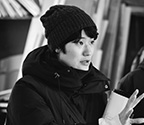Juror
Hirose Nanako
 [Juror’s Statement]
[Juror’s Statement]
No one knows about anyone else. It is the not knowing that drives you to know, to doubt what is “known.”
Which means that, as a filmmaker, you are not the subject of your films. Sometimes your subject comes out with statements or actions that are completely unpredictable, that you might never have wanted.
The camera comes to express the relationship between filmmaker and subject.
A huge amount of money is needed to make a film. The raising of this money and the coordinating of people’s schedules are just part of the process.
What the camera tries to capture—almost all of it—is beyond the filmmaker’s control. The story takes shape out of a succession of coincidences.
Undoubtedly, the world precedes the film, not the other way around.
All this is incontestable, but fiction tends to give it short shrift. Documentary, on the other hand, is rarely made without this in mind. First and foremost, who you are as a person is put to the test.
You bring your own camera to negotiate with your subjects, and if you are in charge of production you are tested in your gathering and analysis of information. You have to worry about meals for the staff who assist you, and you have to give some compensation to the people who appear in your film. You, employing the inherently aggressive act of filming, are always pondering what it means to be honest, for as long as your film is out in the world. Most of what you go through to make a film is mundane, steady, ongoing work, and not creative in any sense. Documentary always starts from a place of awe at the world and others.
That is precisely why I hold such respect for documentaries, and why I cannot think of documentary and fiction as separate.
I would like to extend my heartfelt thanks for this precious opportunity. I very much look forward to encountering many new gazes and vantage points here at the incomparable Yamagata International Documentary Film Festival. I come as your student.
Born in 1987. Joined BUN-BUKU in 2011. Served as assistant under Kore-eda Hirokazu for Like Father, Like Son (2013) and Our Little Sister (2015), and was also involved in projects like Nishikawa Miwa’s The Long Excuse (2016). In 2019, she made her directorial debut with His Lost Name, for which she also wrote the original screenplay. The same year, she released her documentary film Book-Paper-Scissors.
